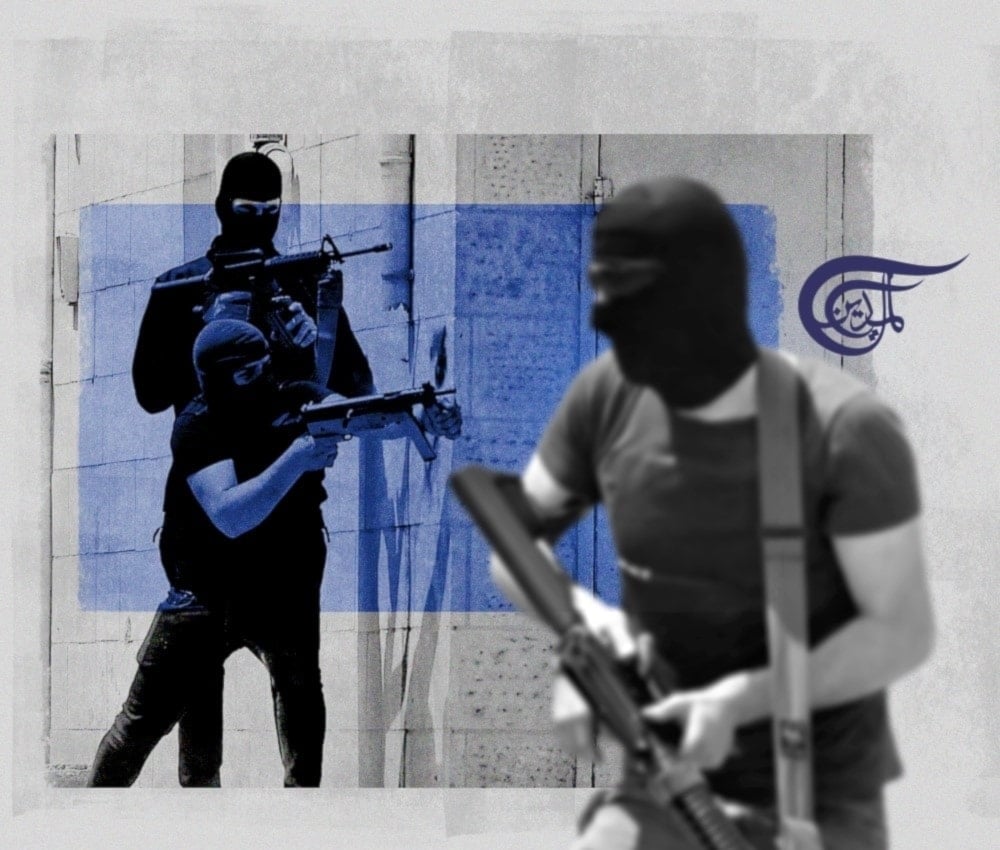West Bank Resistance showing 'bolder, more sophisticated' attacks: NYT
Analysts indicate the attacks suggest the Palestinian groups have developed new technical, logistical, and organizational capabilities, despite intense Israeli efforts to contain them.
-

Palestinian Resistance fighters in the occupied West Bank. (Illustrated by Al Mayadeen)
Confrontations have escalated in the occupied West Bank, with Palestinian Resistance fighters launching "bolder and more sophisticated" attacks amid increased Israeli military raids in the area, The New York Times reported on Monday.
This comes after the Israeli military recently ended a major 10-day aggression on the West Bank that targeted the governorates of Tulkarm, Jenin, and Tubas, killing 39 Palestinians and injuring approximately 150 others. The offensive was subsequently met by the Palestinian Resistance with Operation Terror of the Camps.
The report cited the bombing operation in Tel Aviv, claimed by both Hamas and the Palestinian Islamic Jihad (PIJ), as well as the shooting near the Tarqumiyah checkpoint in al-Khalil, which resulted in the killing of three Israeli police officers. Additionally, it pointed to the recent shooting at the Allenby Bridge crossing, known on the Palestinian side as the Karameh Border Crossing, between Jordan and the occupied West Bank, which killed three Israeli security personnel.
According to the newspaper, citing analysts, the latest operations constitute "the most complex sequence of attacks relating to the volatile West Bank in years."
The analysts also indicated that the attacks suggest the Palestinian groups have developed new technical, logistical, and organizational capabilities, despite intense Israeli efforts to contain them.
Touching on the matter, Ibrahim Dalalsha, the director of the Horizon Center, a research group based in Ramallah, said that "if you compare what’s been happening in recent weeks to what was happening over the past decade, you can see a more organized effort to carry out attacks."
"A bomber with a bomb in his backpack, wandering the streets of Tel Aviv, is a sign that there is a network that is actually supporting something like this to happen," Dalalsha highlighted.
Meanwhile, The New York Times cited Israeli political commentator and former ambassador Alon Pinkas as saying that these events are becoming more likely as the war on the Gaza Strip continues, exacerbating "Israel’s" internal divisions and external vulnerabilities.
In the same context, the newspaper mentioned that Palestinian Resistance fighters in the occupied West Bank said the war had encouraged them to become more active against the Israeli occupation, especially since polls show widespread support in the West Bank for Hamas' Operation Al-Aqsa Flood on October 7, 2023.
Also commenting on the situation in the West Bank, Michael Milshtein, an Israeli analyst of Palestinian affairs, suggested that amid ongoing wars in Gaza and along the border with Lebanon, "We are on the path to a third front."
West Bank could explode in our faces: Israeli security, military establishments
In a similar vein, Israeli security and military officials have warned cabinet ministers that "what is happening in the West Bank could blow up in our faces," reported the Israeli Channel 12.
According to the outlet, the officials have presented a series of urgent recommendations to the cabinet regarding the West Bank, while the Israeli military warned ministers that redirecting forces to the area could come at the expense of the fight in Gaza.
Among the recommendations put forward by security and military officials, signed by Security Minister Yoav Gallant, Chief of Staff Herzi Halevi, and Shin Bet Director Ronen Bar, are increasing prison facilities and preparing for mass detentions, as well as expanding undercover units and maintaining the status quo at the al-Aqsa Mosque compound in al-Quds.
In light of the Palestinian Resistance's growing operations, the Israeli military is trying to prevent a "full-fledged" Intifada (uprising) in the occupied West Bank and taking a series of decisions that have displeased illegal settlers, Israeli media reported.
The military is also warning of Israeli ministers' actions, which are bringing the occupied territory closer to an apocalyptic scene.
Among such decisions is the removal of multiple land barriers in the territory, hoping that allowing Palestinians easier movement in the occupied territory would prevent the entire population of the West Bank from joining acts of resistance.
In this regard, Ron Ben Yishai, a veteran Israeli war correspondent, wrote for the Ynet news website that although the Israeli military command has not outright blamed Police Minister Itamar Ben-Gvir and Finance Minister Bezalel Smotrich for increased "instability" in the West Bank, senior reservists have made such claims.
He said that the expansion of Resistance operations from the northern West Bank to the southern areas in the occupied territories is directly linked to the actions of Ben-Gvir and Smotrich.
According to Ben Yishai, Ben-Gvir's poor management of the already overcrowded prison facilities has also led Israeli forces to delay requests from the Israeli Shin Bet intelligence agency for detaining Palestinians.
Meanwhile, the Israeli newspaper Maariv explained that a "deal to return the captives and the ceasefire in Gaza might be [Israel's] last chance to prevent this apocalyptic vision," explaining that calm in the Palestinian enclave would allow for calm in the West Bank.
Read more: 'West Bank from a time bomb to bomb ready to explode': Israeli media

 5 Min Read
5 Min Read








